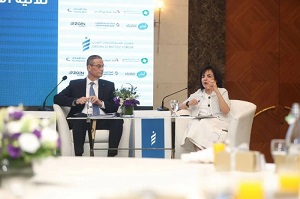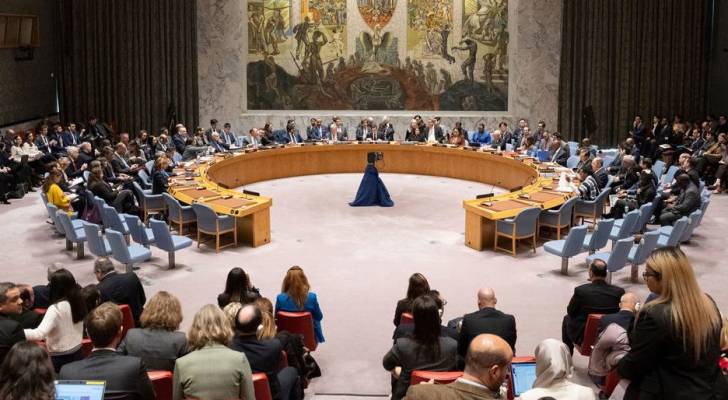Despite regional challenges, Jordan’s economy stable, growth on track — CBJ governor

The Jordan Times
AMMAN — Central Bank of Jordan (CBJ) Governor Adel Sharkas said that Jordan’s economy continues to grow steadily despite regional instability, supported by a clear Economic Modernisation Vision (EMV).
During a forum organised on Monday by the Jordan Strategy Forum (JSF) titled "Reform, Stability, Resilience," Sharkas said that the economy recorded 2.7 per cent growth in both quarter 4 of 2024 and quarter 1 of 2025, the Jordan News Agency, Petra, reported.
The CBJ expects 2025 growth to remain at 2.7 per cent, rising above 4 per cent by 2028 with the implementation of ‘major’ infrastructure projects and continued fiscal reform, Sharkas noted.
He stressed that Jordan’s “strong” fundamentals are solid monetary framework, stable investment climate, healthy banking sector and credible exchange rate.
These factors boosted investor confidence, reflected in the strong performance of Jordan’s Eurobonds, which are trading below issuance yields, he added.
The CBJ governor added that during 2021–2024, the economy grew at an average of 2.9 per cent, recording the highest since 2010, driven by gains in productivity, human capital and non-traditional exports.
This growth contributes now in 20.9 per cent to the gross domestic product (GDP), up from 16.2 per cent in 2016, Sharkas added.
He noted that investment contributed 40 per cent to growth during this period, while external demand contributed 38 per cent.
Sharkas attributed this momentum to structural reforms, with around 100 reforms since 2012, enhancing governance, competitiveness and job creation.
Jordan's energy bill dropped to 7 per cent of the GDP in 2024, down from 21 per cent in 2012, thanks to energy diversification and long-term gas deals, he noted, adding that tourism revenue reached $3.7 billion in the first half of 2025 and is projected to hit $7.7 billion by year-end.
Sharkas said that the foreign direct investment (FDI) reached $1.6 billion in 2024, while remittances are expected to rise to $3.7 billion, while inflation reached 2 per cent in the January-June period of 2025. Foreign reserves hit $22 billion, which is enough to cover 8.4 months of imports.
Bank deposits reached JD47.7 billion in May, while dollarisation declined to 18.1 per cent, the CBJ governor said, pointing out that financial inclusion rose to 43.1 per cent in 2022, with gender gap narrowing from 53 per cent to 22 per cent.
He added that digital payment activity surged to 538 million transactions worth JD55.3 billion in 2024, and credit facilities rose by over JD7 billion since 2020, reaching JD35.3 billion by May.
The CBJ completed 90 of 94 initiatives under the 2023–2025 economic vision. The remaining are on track, Sharkas said.
Public finance reforms are also advancing, with the primary deficit expected to drop to 2 per cent of GDP in 2025, aiming to a surplus by 2027. Public debt is projected to fall below 80 per cent of the GDP by 2028, the CBJ governor said.
JSF Chairman Faris Sharaf stressed the need to balance monetary stability with flexible economic policies.
JSF Executive Director Nasreen Barakat highlighted the forum’s role in fostering evidence-based policy dialogue.
JSF board member Nadia Saeed emphasised CBJ’s regulatory role in supporting sustainable development.
The event also addressed virtual asset regulations, SME support, economic literacy, and Jordan’s resilience to external shocks.
Latest News
-
 Trump says Gaza ceasefire 'possible' amid Starmer talks
Trump says Gaza ceasefire 'possible' amid Starmer talks
-
 Crown Prince attends ICT session within economic vision’s second phase workshops
Crown Prince attends ICT session within economic vision’s second phase workshops
-
 Jordan carries out two more Gaza aid airdrops, with UAE participation
Jordan carries out two more Gaza aid airdrops, with UAE participation
-
 Trump: I spoke with Netanyahu, working on plans for Gaza
Trump: I spoke with Netanyahu, working on plans for Gaza
-
 Two-state solution back in focus at UN peace summit
Two-state solution back in focus at UN peace summit